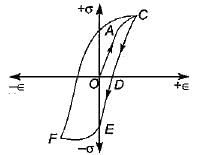Test: Mechanical Properties of Materials - 2 - Mechanical Engineering MCQ
10 Questions MCQ Test Mechanical Engineering SSC JE (Technical) - Test: Mechanical Properties of Materials - 2
Plasticity must be considered in designing for processes except
| 1 Crore+ students have signed up on EduRev. Have you? Download the App |
The loss of strength in compression due to overloading is known as
The property of a material by virtue of which it can be beaten or rolled into plates is called
Which of the following factors does not affect the mechanical properties of a material under applied loads?
The change in the unit volume of a material under tension with increase in its Poisson’s ratio will
True stress-strain curve for material is plotted between
Consider the following statements about truestress-strain method/curve:
1. It is more sensitive to changes in both metallurgical and mechanical conditions.
2. It gives a more accurate picture of the ductility.
3. It can be correlated with stress-strain values in other tests like torsion, impact, combined stress tests etc.
4. It can be used for compression tests as well.
Which of the above statements are correct?
|
5 videos|103 docs|59 tests
|
|
5 videos|103 docs|59 tests
|













